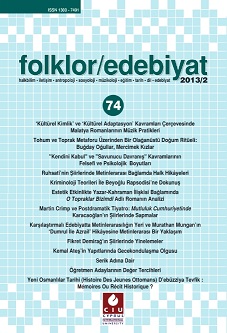Ana Maria Matute’nin Olgunluk Dönemi Romani Issiz Cennet’te İmgeler Ve Düşündürdükleri
Images in Ana Maria Matute’s Maturity-Period Novel the Desolate Heaven and What it Makes one Think About
Author(s): Şebnem AtakanSubject(s): Studies of Literature, Social history, Gender history, Novel
Published by: Uluslararası Kıbrıs Üniversitesi
Keywords: Ana Maria Matute; war; woman; Uninhabited Paradise; images; childhood;
Summary/Abstract: It was an arduous work for women writers namely Carmen Martin Gaite, Carmen Laforet, Josefina Aldecoa and Ana Maria Matute to witness the Spanish Civil War and to pursue writing as a career within the oppressive regime of the post-war era. Ana Maria Matute, who published her first novel in 1948, and who has kept on writing since then, has not only endeavored to fulfill the responsibilities as a wife and a mother but also made great sacrifices to be able to continue her career as a writer, a situation faced by many women writers. Looking back to her childhood years where she finds her inspiration, Matute questions the past in her novel Uninhabited Paradise, a novel which she wrote in her eighties. The idea that human personality and character are formed in childhood is a widely accepted and acknowledged perception regarding the human psyche. Indeed, it is during our early years that bitter-sweet life experiences, the first observations of the environment, and essential aspects that influence and shape our view of life and personality are inscribed deeply into our psyche. With her novel Uninhabited Paradise, Matute shares with us, the reader, that it is the cruel and bloody war that enabled her to experience the loss of innocence, in other words the “paradise”, a notion which is only experienced in childhood years.
Journal: Folklor/Edebiyat
- Issue Year: 19/2013
- Issue No: 74
- Page Range: 249-256
- Page Count: 8
- Language: Turkish

